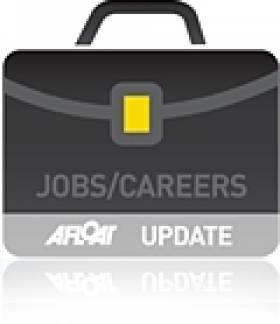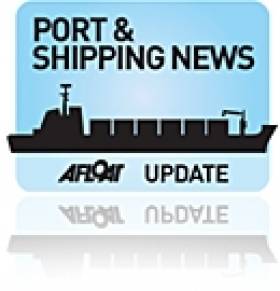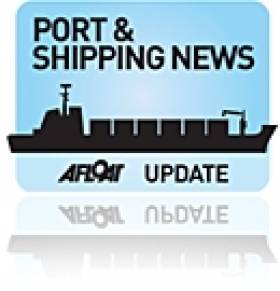Displaying items by tag: Irish Maritime Development Office
Student Positions in Maritime Summer Bursary Scheme
The Bursary programme is a work experience scheme aimed at undergraduates of Universities, Institutes of Technology and National Institutes for Higher Education. The Bursary Scheme is strictly limited to undergraduates who have completed 2 years study in a relevant discipline. Below is a description of the positions and other details.
IMDO – Maritime Economics (2)
Two students are required to provide direct assistance in the key programmes of the Irish Maritime Development Office. The key programme areas include Business Development and Shipping Market Analysis supported by a strategic marketing programme. Two students will be required to co-ordinate research on market and economic issues in the Irish maritime industry and analyse data on competitor maritime jurisdictions.
The successful students will gain a broad knowledge of the maritime industry, international trade, maritime finance, and national shipping development. They will also gain a valuable insight into the national and international maritime transport sector and associated business services, along with experience in collating information and critical analysis.
The student should have good communication and analytical skills. An interest in international trade, business, economics or shipping and logistics is desirable but not essential. The student should be able to work independently and also as part of a team. The bursary will be based in MI-Harcourt Street.
For further information on the busary scheme you can download a PDF file from here and also download a PDF application form here. In addition information in general about the IMDO can be found by logging onto www.imdo.ie and the Marine Institute at www.marine.ie
New EU Passenger Rights for Sea & Inland Waterways
The European Parliament and European Council have formally adopted a regulation giving new compensation rights to passengers using water transport. The regulation is expected to come into force at the end of 2012.
"People are entitled to enjoy the same levels of quality and safety wherever they travel within the European Union. I am very glad that after introducing rights for air and rail passengers, we are now also able to introduce similar rights for passengers travelling by water" said Siim Kallas, Commission Vice President and responsible for transport.
The new regulation that will enable passengers travelling by sea and by inland waterways to enjoy the same rights wherever they travel in the European Union. The information can be viewed in full from the Irish Maritime Development Office (IMDO) website: www.imdo.ie
Below is a list of the new Passenger Rights.
•guarantee of reimbursement or rerouting in situations of cancellation or of delay at departure of more than 90 minutes;
•adequate assistance (such as snacks, meals, refreshments and, where necessary, accommodation up to three nights, with a financial coverage up to €80 per night) in situations of cancellation or delay at departure of more than 90 minutes;
•compensation, between 25% and 50% of the ticket price, in situations of delay in arrival or cancellation of journeys;
•non-discriminatory treatment and specific assistance free of charge for disabled persons and persons with reduced mobility both at port terminals and on board ships, as well financial compensation for loss or damage of their mobility equipment;
•minimum rules on information for all passengers before and during their journey, as well as general information about their rights in terminals and on board ships;
•establishment by carriers and terminal operators of complaint handling mechanism available to passengers;
•establishment of independent national bodies for the enforcement of the regulation, through, where appropriate, the application of penalties.
In addition further detailed information about passenger rights in all modes of transport can be found HERE.
IMDO Release Third Quarter Shipping Figures
The latest figures announced by the Irish Maritime Development Office (IMDO) has revealed that the volume of goods passing through Irish ports increased across all the main shipping segments during the 3rd quarter of 2010 compared to the same period last year.
Exports of container were up 12%, roll-on/roll-off volumes on Ireland – UK routes is up 3%, dry bulk volumes up 40%, and liquid bulk up 19%.
Containersized traffic shipped through ROI ports recorded a quarter-on-quarter volume growth for the 3rd quarter 2010 up 4% to 218,377 twenty equivalent units (TEU). This was primarily as a result of strong export demand, which rose by 12% in the last quarter.
This sector is characterized by export traffic to USA and Asia largely influenced by the multinational chemical and pharmaceutical industries and also established indigenous Irish exporting companies. The other factor contributing to the aggregate rise was the increase in container imports during this period. This was also the first quarter-on-quarter growth in import volumes since the beginning of 2009.
Roll-on/roll-off (ro/ro) traffic to the UK from ROI ports continued to make a steady recovery up 3% for the 3rd quarter which is consistent with overall figures for the 9 months from Jan – Sept period which is up 3%, to 568,833 units. The ro/ro segment is largely weighted towards services to and from the UK which remains our largest trading partner.
In the dry bulk trade, traffic through all Irish Ports continued to recover some of the large volume losses experienced in 2009 and is up 40% for the 3rd quarter compared to the same period last year and 26% for the first 9 months of 2010. Part of the rise is attributed to strong global demand for ore and mineral products such as alumina, while domestic demand in the agricultural sector experienced a rise in imports of grains, feeds and fertilizers. While the overall picture is positive; the main volume gains are distributed to the larger ports with some of the smaller regional ports still in negative territory.
Break bulk volumes of construction related products fell again in the third quarter, bringing the total decline for the third quarter to -10%. Between 2008 and 2010 over 700,000 tonnes of break bulk commodities have been lost from the market. Importantly the fall off in volumes has not slowed in 2010 with an average quarterly drop of 10%.
Liquid bulk volume rose in Q3 by 19% year-on-year. However overall volumes for the first 9 months of the year remain unchanged.
The outlook for the remainder of the year suggests that some volume recovery in the main market segments will be achieved this year. However the total volume in many segments are still running at 35% less than 2007 volumes. Many shipping operators also comment that while export volumes have remained resilient over this period, there are few new companies emerging in the export market. Otherwise there are concerns about the impact of austerity measures in the Euro zone and at home.
Source: Glenn Murphy, Director of the IMDO. For more about the IMDO logon here.
Short Sea Shipping Company Competition Announced
The Short Sea Shipping award is organsised by the Irish Exporters Association (IEA) in conjunction with the Irish Maritime Development Office (IMDO). The awards ceremony will culminate on 25 November when the Taoiseach will present the category winner, and the overall Exporter of the Year.
Further information and application forms for the Short Sea Shipping Company of the Year 2010 and the Export Industry Awards, including details around
export supports is available at www.irishexporters.ie or alternatively contact [email protected]
Irish Shipping Trade Volumes Return to Growth
The midyear data in particular points towards trade volume growth in three of the principal freight segments; most significantly in lift-on/ lift-off (lo/lo) export trades which we estimate grew by 5%. Roll-on/Roll-off export traffic was also up 5% per cent on an all island basis. Dry bulk volumes through ROI ports increased by 15% for the first six months compared to the same period last year. Shipments in April this year saw the strongest monthly volume of bulk cargoes in over 2 years.
Roll-on/roll-off (ro/ro) traffic on an all-Island basis continued to make a steady recovery with an increase of 2%, up to 771,585units for the first half of 2010. The ro/ro segment is largely weighted towards services to and from the UK which remains our largest trading partner.
The most significant change in volume has been in the main lo/lo trades. Overall total volume including export and imports fell only marginally by 1% to June with 517,552 units being handled. However this compares to a -24% reduction for the same periods last year.
A key factor in the positive upward movement has been the continued strong performance of export volumes which as noted was up 5% year on year. Import volumes were down 2% which is largely as a result of continued weak domestic demand. Nonetheless the rate of decline in import volumes has eased sharply which is possibly also offset by demand for industrial imports used as inputs for the merchandise export trades.
The sharp fall in import units over the last 24 months has inversely created a problem for export companies as there is now reduced supply of export quality containers available in Ireland. As a result shipping lines have to reposition empty containers from the UK and Continent which in turn adds to the overall cost of the export box.
Dry bulk (Bulk carrier) trades recovered some of the record volume losses seen in 2009 with a strong 15% increase between January and June. Part of this recovery is attributed to stronger domestic demand for grains, fertilizers and other agricultural products, while improved global demand for steel and other ore aggregates also pushed up volume throughput.
Breakbulk volumes through ROI ports linked to construction inventories such as steel and timber continued to decline by 11%, which is half the recorded figure for 2009. Nonetheless volume activity in this segment remains at a historically low level.
Liquid bulk (Tanker) volumes such as oil fell by 4%, with lower transshipment storage for the US market and other seasonal factors impacting on demand. The outlook for continued short term volume recovery remains largely contingent on the external recovery in the global economy.


























































